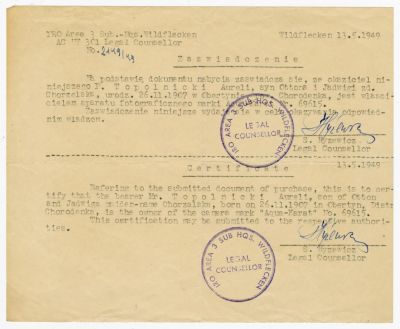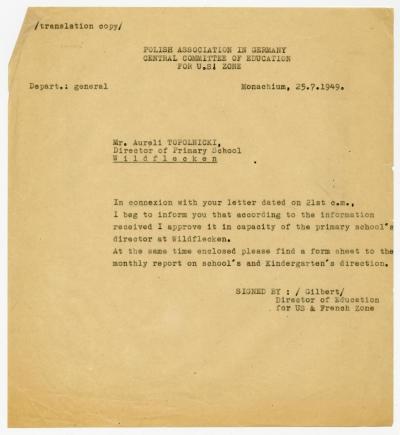The estate of Aureli Topolnicki, resident between 1945 and 1951 in the DP camp in Wildflecken (Durzyn)

Both these reasons applied to Aureli de Sas Topolnicki, who laid great value on his aristocratic roots. Hence it was unheard of for him to be repatriated to Poland with his family. Topolnicki was born on 26. November 1907 in the pretty little village of Obertyn in the district of Horodenka in eastern Galicia that was part of the Austrian-Hungarian Kingdom at the time.[7] When Poland became an independent country once again at the end of the First World War this heterogeneous ethnic, cultural, linguistic and confessional area (it contained Poles, Ruthenians, Ukrainians, Jews, Germans and other smaller minorities) was made part of the Second Polish Republic. The Topolnicki family had its roots here in the Eastern area. True, the documents contain no information about Aureli Topolnicki’s childhood and youth, but he must have taken his A-levels because in 1929 he passed an exam and was awarded a grant from the state to study at a state teachers training college in Nieszawa, where he was awarded a teaching diploma in1932. His best subjects were religion, music and German. After this he worked as a teacher for two years, presumably in Bolechów [8], a small town in the district of Dolina in the County of Stanisławów, around 130 kilometres north-west of Obertyn [9]. Here, on 19 October 1934 he was married to Irma Saling [10] , who was seven years younger. Her name leads us to suspect that she came from a German (or German-speaking) family on her father’s side. This is further strengthened on the one hand by the fact that under Austrian rule many Germans moved to the town of Bolechów and the surrounding regions. On the other hand we know that Irma Saling was baptised on her first birthday, 20 April 1915, in Fleißen (Czech: Plesná), a town in the district of Eger (Cheb) in the Sudetenland whose majority population was German, but which ws a part of Czechoslovakia from 1918 until the Munich Agreement made on 29. September 1938. By contrast Irma’s mother, Tekla Łatyk, came from a Polish family [11]. On the 26. August 1935 Aureli Topolnicki swore an official oath of service and on 1. September 1935 he became a temporary teacher in the state secondary school – it had three age groups – in Raków in the district of Dolina [12]. In December 1937 he passed the practical teaching examination with a final grade of “good”, and was henceforth qualified to teach in state schools [13]. As a result Topolnicki applied to be transferred to another school and on 1. September 1938 he took up a post at the boys’ school in Bolechów [14].
Shortly before this his son Otto was born on 20. May 1938 [15]. He was to remain the sole child in the family. Aureli, Irma and Otto were living in Bolechów when the war broke out. After the division of the Polish state by the Germans and the Russians as a result of the so-called Hitler-Stalin pact , the Polish territories east of the Rivers Narew, Vistula and San passed into the hands of the Soviet Union. On 22. June 1941 the German army invaded the Soviet Union as part of Operation Barbarossa, and took the area of Galicia into the General Government. During this time Topolnicki had continually worked at the state school in Bolechów [16]. Around three months after the German army invaded the Soviet Union he was appointed as the headmaster of the state school in Bolechów by the chief of the district of Kałusz His knowledge of German, and possibly the fact that his wife came from a German family, presumably proved an advantage here [17]. According to family relations Topolnicki’s family left Bolechów for Lower Austria (Southern Moravia) sometime between summer and autumn 1943 because they were afraid of the approaching Red Army [18]. However, from the documents in Topolnicki’s estate it is unclear whether all three members of the family left Bolechów at the same time and for the same destination. A handwritten note tells us of a departure from Kraków on 17. September 1943 and an arrival three days later in the Lower Austrian town of Retz. However it seems that Topolnicki did not arrive in the south Moravian town of Lundenburg, around 100 kilometres east of Retz, until September 1944 [19]. On the other hand his identity card issued in December 1945 in Wildflecken-Durzyn notes that the “civilian [was] deported to Germany” [20](Lundenburg) on 16. July 1943. Equally the identity card issued to Irma Topolnicka by the municipal authority in Wildflecken-Durzyn says that she was deported to Lundenburg on 15. August 1944 [21].
[7] Translation of an excerpt from the Obertyn baptismal register, 7.6.1949 (Latin original, 1.9.1919), [Inheritance of Aureli Topolnicki, Document no. 008].
[8] Certified translation of the teacher’s diploma issued by the state teachers training college in Nieszawa on 5.9.1944 (Original issued on 3.6.1932), [Inheritance of Aureli Topolnicki, document no. 097].
[9] Handwritten notice giving Topolnicki’s whereabouts and dates between 1933 and 1947, [Inheritance of Aureli Topolnicki, document no. 045].
[10] Copy of the excerpt form the Bolechów church register (Latin), dated 1.12.1949 (Original issued on 9.1.1936), [Inheritance of Aureli Topolnicki, document no. 011].
[11] Transcription of the birth certificate of Irma Saling, issued on 20.4.1940, [Inheritance of Aureli Topolnicki, document no. 039].
[12] Certified translation of the appointment of Aureli Topolnicki as a teacher in Raków dated 5.9.1944 (Original issued on 1.9.1935), [Inheritance of Aureli Topolnicki, document no. 098].
[13] Certified translation of the report on the practical examination of Aureli Topolnicki as a teacher in a state school, dated 5.9.1944 (Original issued on 18.12.1937), [Inheritance of Aureli Topolnicki, document no. 099].
[14] Certified translation of the letter transferring Aureli Topolnicki to the boys school, dated 5.9.1944 (Original issued on 12.7.1938), [Inheritance of Aureli Topolnicki, document no. 100].
[15] Otto Topolnicki’s school report for the 5. class at the school in Wildflecken, issued on 30.4.1950, [Inheritance of Aureli Topolnicki, document no. 058].
[16] Registration card issued to Aureli Topolnicki by the office of labour in Drohobycz, giving his profession, [Inheritance of Aureli Topolnicki, document no. 125].
[17] Request from the district captain in Kalusch to Topolnicki to start his service as headmaster of the Polish school in Bolechów, 30. September 1941, [Inheritance of Aureli Topolnicki, document no. 074].
[18] Telephone interview with Barbara Karbarz, dated 18.03.2017
[19] Handwritten notice giving Topolnicki’s whereabouts and dates between 1933 and 1947, [Inheritance of Aureli Topolnicki, document no. 045]..
[20] Aureli Topolnicki’s ID, issued on 22.12.1945 by the state administrative office in Wildflecken-Durzyn, [Inheritance of Aureli Topolnicki, document no. 127].
[21] Irma Topolnicka’s ID, issued on 28.12.1945 by the state administrative office in Wildflecken-Durzyn, [Inheritance of Aureli Topolnicki, document no. 131].









































![Document no. 35/1 Document no. 35/1 - Handwritten letter [in Polish] from M. Paledog from Cheltenham/England to A. Topolnicki.](/sites/default/files/styles/width_100_tiles/public/assets/images/12890-031-1a.jpg?itok=gfPskEix)
![Document no. 35/2 Document no. 35/2 - Handwritten letter from M. Paledog from Cheltenham/England to A. Topolnicki, [p. 2].](/sites/default/files/styles/width_100_tiles/public/assets/images/12890-031-1b.jpg?itok=Df4ctKpD)
![Document no. 36/1 Document no. 36/1 - Envelope to the letter [Document 35] from Paledog to Topolnicki.](/sites/default/files/styles/width_100_tiles/public/assets/images/12890-031-2a.jpg?itok=krd42nL9)
![Document no. 36/2 Document no. 36/2 - Back of the envelope to the letter [Document 35] from Paledog to Topolnicki.](/sites/default/files/styles/width_100_tiles/public/assets/images/12890-031-2b.jpg?itok=K_dTfhNe)

![Document no. 38 Document no. 38 - Topolnicki is informed about the progress of his immigration application [ assurance is recognised].](/sites/default/files/styles/width_100_tiles/public/assets/images/12890-033.jpg?itok=OKjuXvyn)
![Document no. 39 Document no. 39 - [Handwritten copy of the] birth certificate of Irma Saling, the wife of Aureli Topolnicki.](/sites/default/files/styles/width_100_tiles/public/assets/images/12890-034-1.jpg?itok=Qcvw5Oaz)











































































































































![Dokument Nr. 127/1 Dokument Nr. 127/1 - Personalausweis von A. Topolnicki mit Lichtbild und Informationen zur Person und Aussehen, zudem Information über die Deportation nach Lungenburg [Lundenburg] am 16.7.1943](/sites/default/files/styles/width_100_tiles/public/assets/images/12890-096a.jpg?itok=pKJpAuzw)
![Dokument Nr. 127/2 Dokument Nr. 127/2 - Personalausweis von A. Topolnicki mit Lichtbild und Informationen zur Person und Aussehen, zudem Information über die Deportation nach Lungenburg [Lundenburg] am 16.7.1943.](/sites/default/files/styles/width_100_tiles/public/assets/images/12890-097b.jpg?itok=RIjcT74Q)




















































